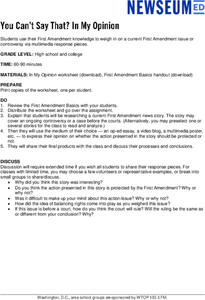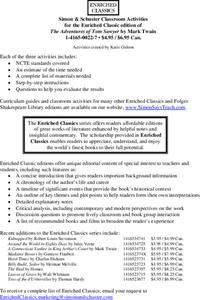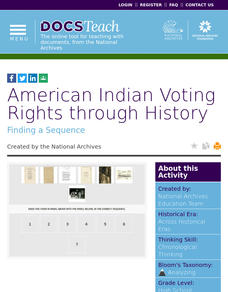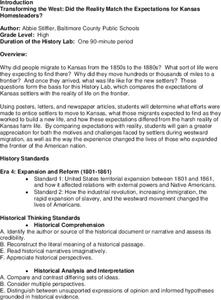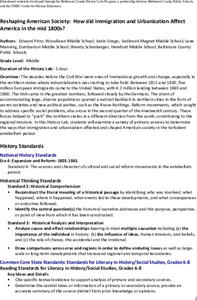Center for History Education
Guatemalan Coup of 1954: How Did the Cold War Influence American Foreign Policy Decisions?
Was it all about the bananas—or the fear of a communist threat? Young historians use a history lab to examine documents from the American-led 1954 Guatemalan coup. Using graphics, government documents, and speeches, they examine the...
Newseum
Journalists Code of Ethics
Journalists are supposed to adhere to a Code of Ethics. To determine the degree to which reporters follow this code, individuals select three recent stories with photographs from newspapers, magazines, online news sites, or television...
Newseum
Disinformation Nation: Separating Politics and Propaganda
Separating political rhetoric from propaganda is no small feat. Class members are challenged to examine two different sources about a candidate in an upcoming election and determine whether the primary purpose of the source is to inform...
Newseum
Reporting Part III: Staying Objective
The third and final lesson in the Reporting series tests young journalists' ability to be objective in reporting contentious topics. After brainstorming a list of contentious topics that interest them, the class selects one, and...
Newseum
Reporting Part II: Beyond the Basics
Scholars examine the articles written for the series' first lesson and select ones that would benefit from further research. In a 48-hour deadline, teams of three select one topic to investigate in greater depth and craft a revised...
Newseum
Reporting Part I: What Matters to Me
Young reporters have an opportunity to craft a news story about a topic that interests them. Class members brainstorm events and issues that affect them and possible sources of information. Individuals then select a topic, research it,...
Discovery Education
Writing about Symbolism and Emotion in Huckleberry Finn
To complete a study of The Adventures of Huckleberry Finn, readers select a well-known quotation or symbol from the novel to use in an essay that analyzes how the quotation or symbol relates to the novel's themes.
Simon & Schuster
Curriculum Guide to: Adventures of Huckleberry Finn by Mark Twain
Five lessons make up a curriculum guide to The Adventures of Huckleberry Finn. Readers find examples of Twain's use of irony, closely examine Huck's colloquial language, as well as his sense of morality, and identify themes in the novel....
Utah Education Network (UEN)
Lessons Learned in Adventures of Huckleberry Finn
To conclude a study of The Adventures of Huckleberry Finn, class members create illustrated newsletters about Huck's lessons as he journeys down the Mississippi River. Using Microsoft Publisher, pairs copy, save, and import illustrations...
Newseum
You Can’t Say That: In My Opinion
As a part of a study of the First Amendment, high schoolers research a current news story that seems to involve one of the freedoms granted by the First Amendment. Investigators decide whether they think the action presented in the story...
Simon & Schuster
Classroom Activities for The Adventures of Tom Sawyer by Mark Twain
A 16-page packet includes three activities for a unit study of Mark Twain's The Adventures of Tom Sawyer. Before beginning the novel, class members identify the factors in their lives that helped create their frame of reference,...
Newseum
Civil Rights: Your Stories of Change
Young activists examine local civil rights issues presented in news media sites to determine what elements make these stories attention-grabbing and trustworthy. Using this information and their worksheets from the first two lessons in...
Newseum
Civil Rights: The Five Freedoms
After a close reading of the First Amendment and the five freedoms it guarantees, class members examine the civil rights timeline to see how civil rights groups applied these freedoms to create change. Using the issue the class chose in...
Newseum
Civil Rights: Identifying Community Issues
As part of the social, economic, and legal/political civil rights study, class members brainstorm a list of current civil rights issues that affect their community. Individuals or pairs select one issue to research further. The class...
Texas Education Agency (TEA)
Legal Responsibilities of Financial Exchanges
Let's stock up on knowledge! With lecture and discussion, pupils explore the legal responsibilities of monetary exchange. Scholars then research laws about financial exchange in the stock market and create a poster to illustrate their...
DocsTeach
Documenting Key Presidential Decisions
It's match time! Academics participate in an exciting matching game using primary sources. The activity uses documents of key decisions and matches them to the presidents that they are attributed to. Scholars also make a list of key...
DocsTeach
Debating Monuments, Memorials and Statues
An illustrative activity explores images of monuments, statues, and memorials in the US to decide whether they should be kept or removed. Scholars place images in a keep or remove pile, then complete a worksheet online. The resource...
DocsTeach
Analyzing an Allegorical Statue
Everyone sees art differently. An informative resource focuses on the image analysis of an allegorical statue. Scholars study the photo of the statue and complete a worksheet based on their findings. To finish, academics participate in...
DocsTeach
Can you Identify the First Lady?
Guess Who? The first lady edition! Scholars read documents to figure out the first lady that is being described. The activity focuses on Pat Nixon, the wife of President Richard Nixon. Academics then work in pairs and share their...
DocsTeach
Baseball: A Morale Booster During Wartime?
How did baseball become America's national pastime? A sports-minded activity explores the importance government placed on baseball to boost morale during both world wars. Academics read letters to understand the importance of baseball...
DocsTeach
American Indian Voting Rights through History
Vote ... it's your right! An enlightening lesson examines the history of voting rights for Native Americans. Leaners analyze primary documents and place them in chronological order. Academics also create a list of other events that took...
DocsTeach
A Revolution, a Reaction and a Reform: Getting Ready for National History Day
Get ready for National History Day! A thought-provoking activity focuses on a hypothetical project for National History Day (NHD). Academics review three primary sources to determine if they would meet the criteria for a NHD project....
Center for History Education
Transforming the West: Did the Reality Match the Expectations for Kansas Homesteaders?
They expected good soil and hearty crops ... but they found buffalo chips and grasshopper plagues. Using an advertisement encouraging famers to go west, budding historians examine primary sources including letters, photographs, and...
Center for History Education
Reshaping American Society: How did Immigration and Urbanization Affect America in the mid 1800s?
From the Know-Nothings to the Bible Riots, immigration and urbanization changed the face of America in the middle of the 1800s. Using documents that range from immigrant experiences to renderings of violent conflict between immigrants...











